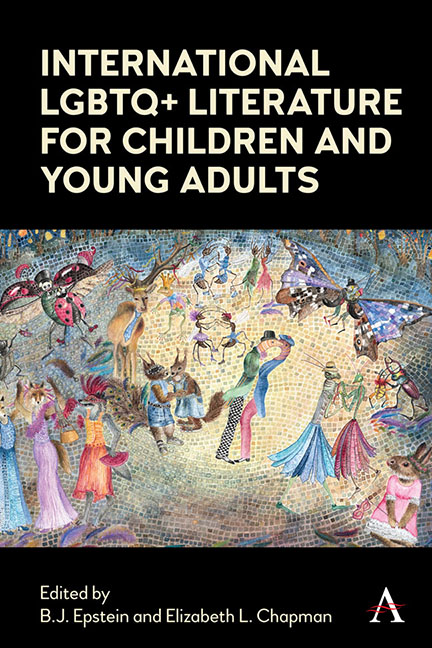Book contents
- Frontmatter
- Dedication
- Contents
- List of Illustrations
- Acknowledgements
- Notes on contributors
- Introduction
- BRAZIL
- FRANCE
- GERMANY/ AUSTRIA
- GREENLAND
- INDIA
- INDIGENOUS WRITING
- ITALY
- MULTINATIONAL
- MULTINATIONAL
- MULTINATIONAL
- THE PHILIPPINES
- SLOVENIA
- SOUTH KOREA
- SPAIN
- SWEDEN
- SWEDEN
- List of Primary Texts
- Index
Chapter Twelve - Between Literature, Ideology and Pedagogy: LGBTQ+ Fiction for Children and Young Adults in Slovenia
Published online by Cambridge University Press: 18 November 2021
- Frontmatter
- Dedication
- Contents
- List of Illustrations
- Acknowledgements
- Notes on contributors
- Introduction
- BRAZIL
- FRANCE
- GERMANY/ AUSTRIA
- GREENLAND
- INDIA
- INDIGENOUS WRITING
- ITALY
- MULTINATIONAL
- MULTINATIONAL
- MULTINATIONAL
- THE PHILIPPINES
- SLOVENIA
- SOUTH KOREA
- SPAIN
- SWEDEN
- SWEDEN
- List of Primary Texts
- Index
Summary
Introduction
Slovenia is a country variously described as part of Central, Eastern or Southern Europe or the Western Balkans, depending on the writer's perspective, ideology or reference book. An EU member state since 2004, it has only been independent since 1991, having previously been part of, among others, the Socialist Federal Republic of Yugoslavia, the Kingdom of Serbs, Croats and Slovenians (later the Kingdom of Yugoslavia), and the Austro-Hungarian Empire. It is perhaps understandable that, without a nation state to rely on, Slovenian national awareness and identity have had to rely primarily on the Slovenian language, culture and literature, although their role and actual impact in the nation-building processes have been debated (Dović 2017).
When Slovenian lands were still part of larger state unions, ‘unnatural fornication’ was penalized in accordance with the states’ penal codes. Slovenia's specific development began when – together with some other, but not all, republics of SFR Yugoslavia – it decriminalized sexual acts between men in 1977. The 1930 Penal Code of the Kingdom of Yugoslavia had punished homosexual acts between men and women, whereas Yugoslavia's 1951 Penal Code kept the provision, with an amended penalty, for men only.
The fall of the Berlin Wall in 1989 marked a turning point in the development of LGBTQ+ movements in Eastern Europe, but in Slovenia it had started a little before that – in 1984 with the six-day festival Homosexuality and Culture. Since Slovenia's independence, LGBTQ+ activism has diversified and worked towards greater social and legal inclusion of LGBTQ+ people. The first Ljubljana Pride Parade was organized in 2001 as a protest against a homophobic incident during which the poets Brane Mozetič and Jean-Paul Daoust were denied entry into a café. In terms of LGBTQ+-specific legislation, 2005 saw the introduction of the Civil Partnership Registration Act, granting LGBTQ+ people only a handful of rights, while 2011 brought a new Family Code (same-gender couples were granted all the rights enjoyed by heterosexual couples except for joint adoption and artificial insemination). The Code was rejected by a referendum called for by conservative groups supported by the Catholic Church.
- Type
- Chapter
- Information
- International LGBTQ+ Literature for Children and Young Adults , pp. 225 - 250Publisher: Anthem PressPrint publication year: 2021

